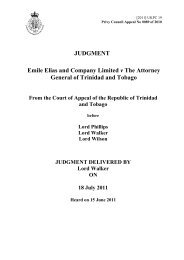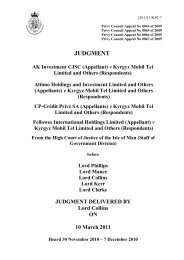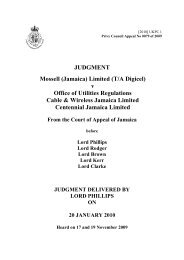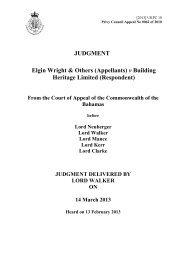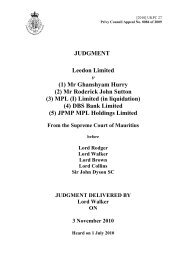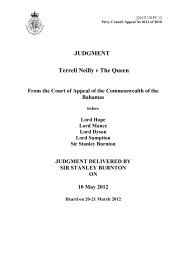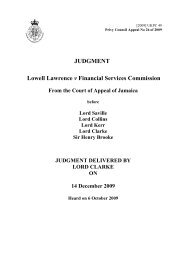Nadine Rodriguez v (1) Minister of Housing of the Government (2 ...
Nadine Rodriguez v (1) Minister of Housing of the Government (2 ...
Nadine Rodriguez v (1) Minister of Housing of the Government (2 ...
You also want an ePaper? Increase the reach of your titles
YUMPU automatically turns print PDFs into web optimized ePapers that Google loves.
analogous. Sometimes, where <strong>the</strong> position is not so clear, a different approach<br />
is called for. Then <strong>the</strong> court’s scrutiny may best be directed at considering<br />
whe<strong>the</strong>r <strong>the</strong> differentiation has a legitimate aim and whe<strong>the</strong>r <strong>the</strong> means chosen<br />
to achieve <strong>the</strong> aim is appropriate and not disproportionate in its adverse<br />
impact.”<br />
19. In this case we have a clear difference in treatment but not such an obvious<br />
difference between <strong>the</strong> appellant and o<strong>the</strong>rs with whom she seeks to compare herself.<br />
The appellant and her partner have been denied a joint tenancy in circumstances<br />
where o<strong>the</strong>rs would have been granted one. They are all family members living<br />
toge<strong>the</strong>r who wish to preserve <strong>the</strong> security <strong>of</strong> <strong>the</strong>ir homes should one <strong>of</strong> <strong>the</strong>m die. The<br />
difference in treatment is not directly on account <strong>of</strong> <strong>the</strong>ir sexual orientation, because<br />
<strong>the</strong>re are o<strong>the</strong>r unmarried couples who would also be denied a joint tenancy. But even<br />
if, as Dudley J found, <strong>the</strong>se are <strong>the</strong> proper comparator, <strong>the</strong> effect <strong>of</strong> <strong>the</strong> policy upon<br />
this couple is more severe than on <strong>the</strong>m. It is also more severe than in most cases <strong>of</strong><br />
indirect discrimination, where <strong>the</strong> criterion imposed has a disparate impact upon<br />
different groups. In this case, <strong>the</strong> criterion is one which this couple, unlike o<strong>the</strong>r<br />
unmarried couples, will never be able to meet. They will never be able to get married<br />
or to have children in common. And that is because <strong>of</strong> <strong>the</strong>ir sexual orientation. Thus it<br />
is a form <strong>of</strong> indirect discrimination which comes as close as it can to direct<br />
discrimination. Indeed, Mr Singh puts this as a Thlimmenos case: <strong>the</strong>y are being<br />
treated in <strong>the</strong> same way as o<strong>the</strong>r unmarried couples despite <strong>the</strong> fact that <strong>the</strong>y cannot<br />
marry or have children in common. As Ackermann J put it in <strong>the</strong> South African<br />
Constitutional Court decision in National Coalition for Gay and Lesbian Equality v<br />
<strong>Minister</strong> <strong>of</strong> Home Affairs [2000] 4 LRC 292, at para 54, <strong>the</strong> impact <strong>of</strong> this denial<br />
“constitutes a crass, blunt, cruel and serious invasion <strong>of</strong> <strong>the</strong>ir dignity”.<br />
20. Mr Neish seeks to meet this argument by relying on <strong>the</strong> line <strong>of</strong> cases in <strong>the</strong><br />
European Court <strong>of</strong> Human Rights which have upheld special privileges for married<br />
couples (and latterly civil partners). In some <strong>of</strong> <strong>the</strong>se <strong>the</strong> Court has said that married<br />
and unmarried hetero-sexual partners are not in an analogous situation: see in<br />
particular <strong>the</strong> admissibility decisions in Shackell v United Kingdom (Application No<br />
45851/99) (unreported) 27 April 2000, citing Lindsay v United Kingdom (1986) 9<br />
EHRR CD 555, and <strong>the</strong> recent decision in Serife Yigit v Turkey (Application No<br />
3976/05) (unreported) 20 January 2009, privileging civil over religious marriages in<br />
Turkey. In Burden v United Kingdom (2008) 47 EHRR 857, <strong>the</strong> Grand Chamber<br />
observed at para 63:<br />
“In Shackell, <strong>the</strong> Court found that <strong>the</strong> situations <strong>of</strong> married and unmarried<br />
heterosexual cohabiting couples were not analogous for <strong>the</strong> purposes <strong>of</strong><br />
survivors’ benefits, since ‘marriage remains an institution which is widely<br />
-9-


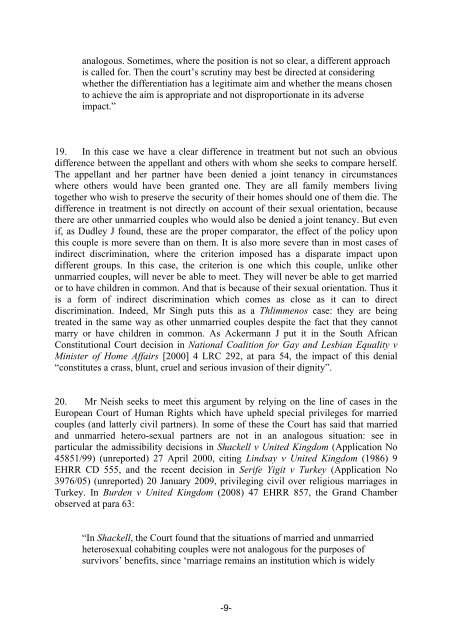
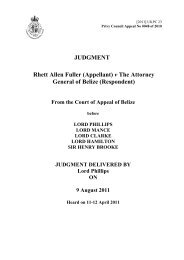
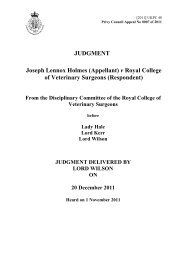
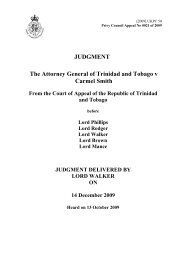
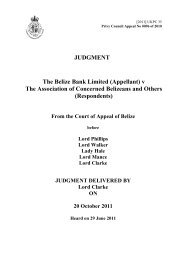
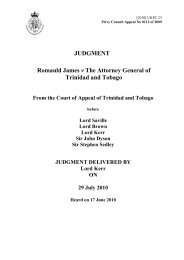
![[2011] UKPC 10 - Judicial Committee of the Privy Council](https://img.yumpu.com/23644185/1/184x260/2011-ukpc-10-judicial-committee-of-the-privy-council.jpg?quality=85)
